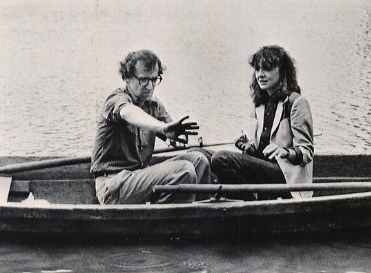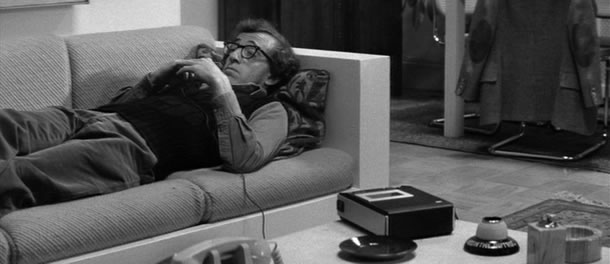 FILM
FILM In Which In Every Man's Heart There Is A Mistress
 Saturday, July 4, 2009 at 8:23AM
Saturday, July 4, 2009 at 8:23AM 
Damn It Feels Good To Be A Gangster
by JACOB SUGARMAN
Broadway Danny Rose opens with Stand-Up Comedian Corbett Monica’s big Miami joke: "It’s like a $150 a day for a sleeping room. I asked the hotel clerk, 'What’s cheaper?’' He said, 'I got a room for $10 dollars but you gotta make your own bed.' I said, 'I’ll take it.' So he gave me a hammer, a board and some nails.” Such is the brand of humor to which the film and its auteur are firmly rooted. In a recent New York feature, Mark Harris argued that Woody Allen and fellow Hebrew in comedic arms, Larry David, were the last of a dying breed. If so, then consider Allen’s 1984 movie a final nod to the Sid Caesars and Milton Berles of yesteryear.

Like so many Allen tales, this story begins with a dinner party. Comics Jackie Gayle, Morty Gunty, Sandy Baron and a few other Catskills staples are kvetching over pickles and sandwiches at the Carnegie Deli, each with their own colorful anecdote about the “legendary” Danny Rose. Played by Allen, Rose is a talent agent extraordinaire whose poor taste is surpassed only by his undying passion for his clients. When one of his performers presents an animal balloon-twisting act, he coaches: "You should open up with the dachshund and then move on and BUILD towards the giraffe." Let’s just say that Ari Gold ain’t got shit on "Broadway" Danny Rose.
When he’s not finding work for a blind xylophonist or a dubious bird whisperer, Rose is busy nursing his lead act, Lou Canova —a throwback lounge singer who’s riding a wave of nostalgic popularity (not unlike Woody himself for the past 15 years). Canova seems destined for stardom when Rose books him as the opening act for a Milton Berle performance. Only in Woodyland can this be considered a big break.
Hilarity ensues when Rose attempts to woo Canova’s mistress, Tina Vitale (Mia Farrow), to come to his client’s show. Vitale's family mistakenly fingers him for ruining her relationship to a sensitive Italian gentleman and this sets a pair of bat-wielding Mafiosos on a mission to pluck Rose’s petals, so to speak. I’ll stop here but this is a Woody Allen movie starring Mia Farrow. You can probably see where this is going.
Broadway Danny Rose is a charming, uneventful comedy that’s still worth a rental for its small pleasures. Photographed by the great Gordon Willis, who shot a bevy of 70’s staples including The Parallax View and The Godfather, the film contains several playful allusions to Coppola’s classic crime saga. If you’re the kind of movie-watcher who likes pointing at his screen excitedly and screaming "That’s where Clemenza wacked Paulie Gatto!,” you won’t be disappointed. Allen’s film also has its share of unintentional comedy as Mia Farrow spends the majority of her screen time channeling the ghosts of Ed Wood.

Unable to convince an audience with half a pulse that she’s a tough, working class, Italian broad, she plays the entire movie behind a pair of oversized sunglasses with her hair up and a cigarette tucked into the corner of her mouth. The whole thing smacks of Bela Lugosi’s body double covering his face during his scenes in Plan 9 from Outer Space.

After being fed a steady diet of Allen’s neurotic, Jewish humor for 40 odd years, it’s easy to dismiss the jokes in Broadway Danny Rose as stale or dated. Still, you can’t help but crack a smile watching Rose tending to his menagerie of goofball clients and their pets (in the film’s closing scene, he’s seated next to a parrot dressed like Little Miss Moffet). It might not be as funny as Annie Hall or as affecting as Manhattan, but Broadway Danny Rose offers a glowing reminder of why we love Woody Allen, even when he’s babbling away like an addled uncle at your cousin’s bat-mitzvah. Here’s hoping he doesn’t go by way of the dodo bird anytime soon.
Jacob Sugarman is a contributor to This Recording. He last wrote in these pages about Robert Mitchum.

"y hospital" - Tree Hopping (mp3)
"w hospital' - Tree Hopping (mp3)
"q hospital" - Tree Hopping (mp3)
Tree Hopping myspace













































